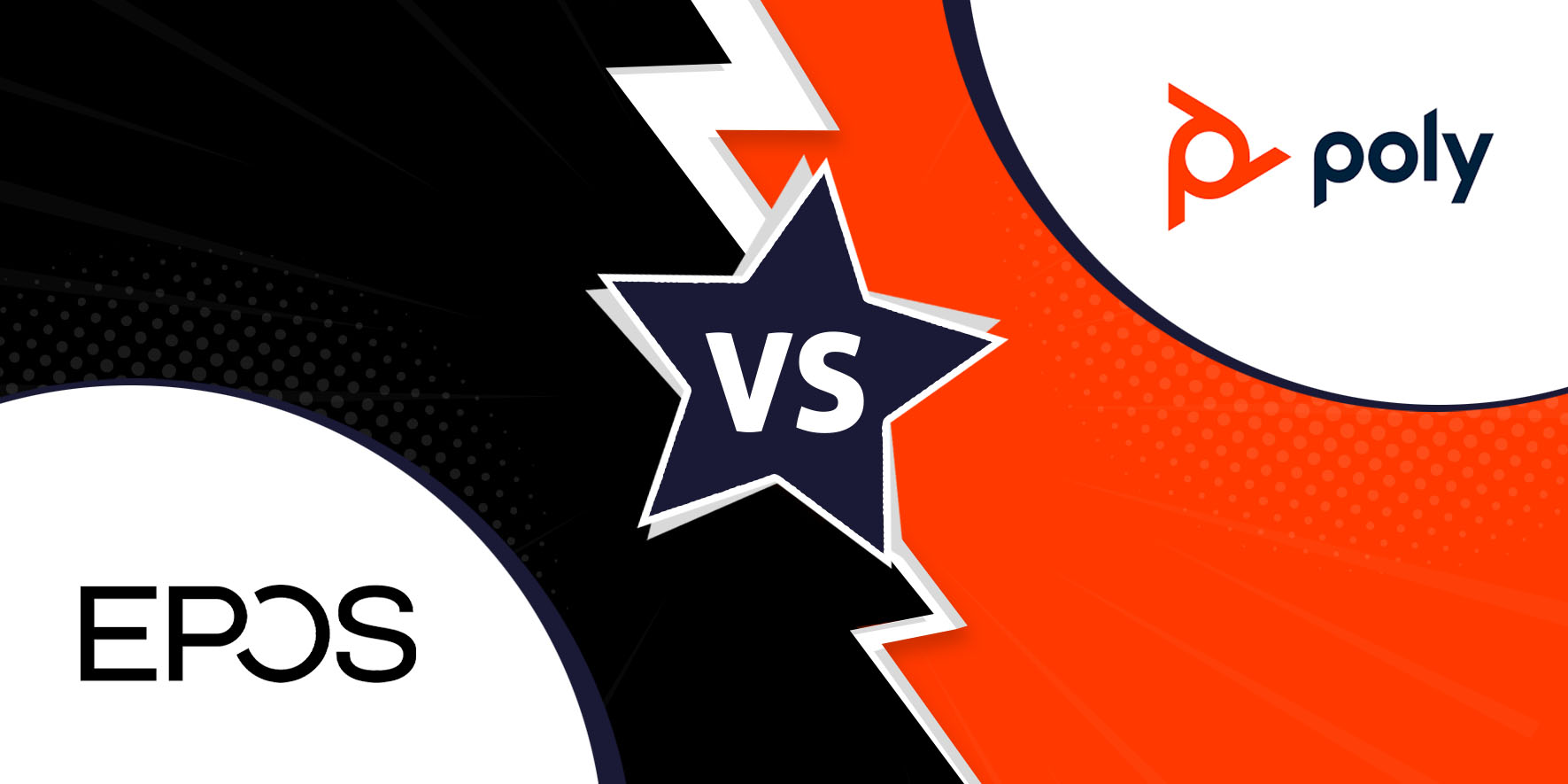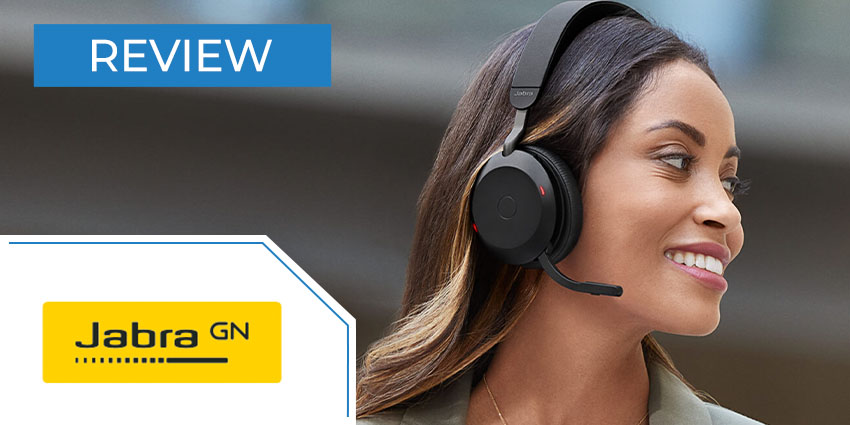It might be a communication staple, but users expect more from their business headsets than ever before. Studies suggest that wearing comfort, noise cancellation, ease of connectivity, and ease of use in high-density workspaces are essential priorities for 95%+ of users. 100% want stellar voice quality that can enable clear communication. On the downside, security concerns are rising, with at least 15% of users not confident about the security mechanisms powering Bluetooth headsets.
Choosing the right headset (for either independent use or business deployment) can be a challenge, navigating so many criteria while also keeping IT efforts under control.
What you need is a globally recognised audio hardware provider, backed by years of expertise while also constantly breaking new ground in audio innovation. Today, we discuss two such providers that belong on your radar: EPOS and Poly.
EPOS is an offshoot of the historical alliance between the hearing healthcare company, Demant and electro-acoustic specialist, Sennheiser Electronic GmbH & Co. KG. In 2019, their joint venture came to an end, and Demant set up a new independent company under the EPOS branding umbrella.
Poly, the result of a merger between Plantronics and Polycom, is a voice and video solutions provider for business customers. Poly‘s headsets and headphones are part of the company’s 360-degree UC endpoint solutions and services.
Let’s discuss what they bring to the table and how you could gain from each headset family.
EPOS Headset Features
EPOS offers headset solutions for different scenarios, such as in-office use, contact centres, mobile workers, and air traffic control (ATC). The company has 70+ devices in the enterprise category, crafted using high-quality materials that combine stellar audio quality with maximum comfort.
EPOS offers a tactile experience meant to deliver incredible ease of use, via touch-and-feel. The company achieves this through a variety of mechanical tests to help develop products suitable for any head shape and ear, without compromising on comfort.
EPOS’ key feature highlights include:
- The flagship ADAPT line powered by EPOS AI, hybrid adaptive AMC, and active noise cancellation
- The IMPACT line for contact centres with tools for easy call handling, a rich sound experience, and longer shelf life
- The COMMAND line, custom-built for ATC users to block ambient noise, featuring a light form factor, noise cancellation/reduction, and single-/double-sided design
- The Power of Audio™ technology for immersive gaming experiences on personal/hybrid headsets
- ActiveGard®, a patented technology to protect against acoustic shocks
- Prebuilt optimisations for UC and Skype for Business
- On-the-go devices with up to 12-hour talk time
EPOS has something for everyone. In the enterprise segment, its headsets span the entire range of use cases, with targeted features for every role/persona. The solutions fit in perfectly with EPOS’ lineup of audio-augmenting collaboration tools, including speaker phones and device management software.
Poly Headset Features
Poly is perhaps better known in the industry for its IP phones and video conferencing consoles – but it has a competitive set of offerings in the headset category as well. In addition to office headsets, contact centre peripherals, mobile workers, and ATC usage, Poly also has powerful devices in the sports headphones category. You can choose from over the head, in-ear, earbuds, and true wireless headphone styles to fit your exact requirements.
Some of the top features of Poly headsets include:
- True wireless headsets for on-the-go calling, integrating with Siri, Google Now, or Cortana
- Smart sensors to automatically answer a call or resume audio, when you put on the headset
- A wide range of office headsets that work with PCs, desk phones, and DECT devices
- Up to 24 hours of listening time, dedicated mute button and seamless switch between two connected devices
- Dual-mode active noise cancellation (ANC) for minimal distractions
- Close conversation limiting in select devices for high-density workspaces
- Blackwire, Voyager, and Encorepro series options for desk, hybrid, and contact centre use
Apart from these headsets, Poly has useful accessories to uplift your business telephony experience. From spare batteries to vendor-specific connectors for Siemens, Avaya, Cisco, Alcatel, and more, from a charger case to spare batteries, Poly is well poised to be an end-to-end solution provider for everything that’s headset-related.
EPOS vs Poly Headsets: Experience
EPOS pays special attention to the user experience, as one might expect from a premium offering. It will guide you through the product selection process, aid in first-time user adoption, provide after-sales training, and support you across the full EPOS product lifespan.
For IT environments, EPOS has its own device manager and library of connectors, SDKs, and plugins. EPOS Manager is available for Windows, Mac OS, and Linux environments. EPOS Connect is an end-user software client to deliver firmware updates and personalise audio settings.
Poly Manager Pro is Poly’s equivalent to a device management software, helping IT troubleshoot and fix headset issues remotely. It integrates with your existing apps like Office 365, Jabber, etc., to connect headsets to your backend systems.
The Hub Desktop and Hub Mobile are Poly’s end-user software offerings, enabling individualised configurations of each headset in a business environment.
EPOS vs Poly Headsets: Integrations
As industry giants, both EPOS and Poly have extremely strong partner networks, letting you deploy your preferred headset configurations with minimal bottlenecks. EPOS works with UC providers, contact centre vendors, device management software developers, and UC management companies across the world.
This includes Citrix, Mitel, 3CX, Microsoft, Genesys, and Google, among others.
Poly headsets are certified to work on most voice platforms, such as Microsoft Teams, Skype for Business, and Zoom. It is also part of the AWS partner network, alongside strategic alliances with Ribbon Communications, Avaya, and Mitel.
Which One is Right For You?
There is no one right answer here. Both EPOS and Poly promise a stellar audio experience, balancing comfort with robust functionalities.
EPOS is a more premium offering, and it comes with the industry-leading audio quality we have come to associate with Sennheiser. Poly is more competitively priced (ideal for bulk deployments) but it doesn’t sacrifice versatility or support. We’d recommend that you deep-dive into each vendor’s use case-specific product families and formulate a smart combination that works for your goals and budgets.







